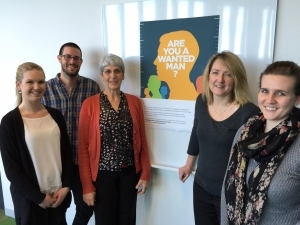Study to develop support for new dads
Research news
Becoming a parent is one of the most significant periods in the lives of both women and men, but men’s experience during this time is not well understood.
This is despite the fact that new fathers, like new mothers, are vulnerable to increased rates of psychological distress, with potentially serious effects on themselves, their families and the wider community.
Deakin researchers from the Schools of Psychology and Health and Social Development are preparing to undertake a landmark study on men’s transition to parenthood and are currently recruiting around 1300 men from around Australia to participate.
Their long-term aim is to identify the strategies that men use to cope successfully during this time and use this information to improve support to Australian men in greatest need.
The Men and Parenting Pathways (MAPP) project will explore how men respond to life experiences during their late 20s and early 30s.
Beginning with men who do not have children aged 28 to 32 years old, the researchers will observe the lives of participants over the next five years, as some make the transition to parenthood, some do not and most experience changes in their social networks, relationships and other areas of their lives.
Participants will complete an on-line survey once a year for five years, while a small sample will undertake a qualitative interview.
“For many men, this is a time when family life looms large, but life can take many directions, and, for those who don’t have children, they may face other challenges, such as potentially feeling on the outer when their friends begin to have children,” said researcher Dr Jacqui Macdonald from Deakin’s School of Psychology.
“Around nine per cent of men experience psychological distress in the 12-month period post-partum and about a third of these have mental health difficulties that persist beyond this period.
"If they are experiencing distress, men are far less likely to seek support than women, despite the fact that adjustments are needed in many areas of their lives.
"Their relationship with their partner has changed and they may face new financial responsibilities, as well as coping with disrupted social lives, lack of sleep and the demands of young children.”
Dr Macdonald added that for most men, fatherhood is a positive change, but others may lack the tools to cope with their new experiences, which can lead to internalised feelings of anger, anxiety, stress, irritability, confusion about role identity, and loss of connection to family and friendship groups.
“The long-term goal of the MAPP project is to build capacity for men to manage this phase of their lives by identifying how and where health planners can most effectively intervene,” she said.
“We hope to develop profiles and patterns of behaviour that show which men are at particular risk and identify the strategies used by those who are doing well. Understanding how to maintain wellbeing during this transition is important for men, their families, social networks and workplaces.”
The study is being undertaken in collaboration with the Parent-Infant Research Institute at Austin Health, and the Murdoch Children’s Research Institute.
For more information, contact Project Manager Dr Briony Hill or Dr Jacqui Macdonald.
Share this story
 Dr Briony Hill (Project Manager), Chris Kings (Hons student), Assoc Prof Tess Knight (Investigator), Dr Jacqui Macdonald (Chief investigator)and Dani Ryan (Hons student).
Dr Briony Hill (Project Manager), Chris Kings (Hons student), Assoc Prof Tess Knight (Investigator), Dr Jacqui Macdonald (Chief investigator)and Dani Ryan (Hons student).
